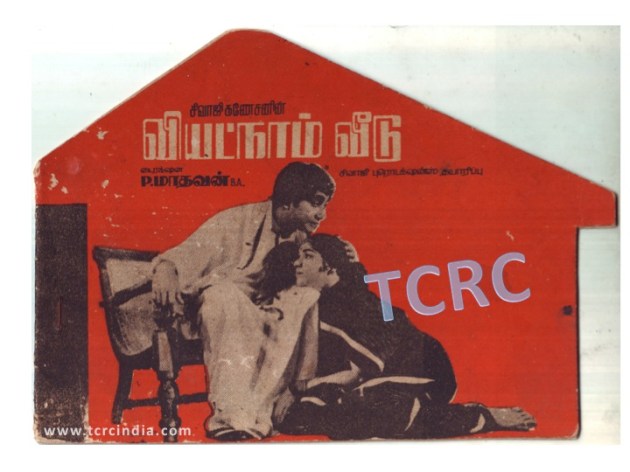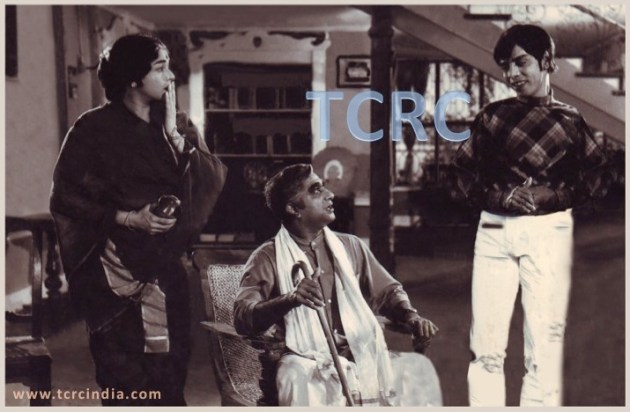By Karthik Bhatt
Monikers over a period of time become so deeply entrenched with one’s identity that it becomes impossible to identify the person without it. While Sundaram may not ring a bell readily, Vietnam Veedu Sundaram would immediately bring to mind the successful stage and cine writer from the 1960s and 1970s. This post on the film that gave him his identity.
Born in Trichy in 1940, Sundaram came to Chennai around 1955. His formal education had been cut short by poverty. Perhaps as an indicator of how his life would unfold, he found accommodation with and company of two others at the famed Club House in T Nagar (opposite the Siva Vishnu temple) who were already on their way to becoming well-known names in the tinsel world, Nagesh and Srikanth. He joined the Dunlop Tyre Company as a machine operator even when their factory was under construction on a night shift.
It was around this time that the world of Tamil theatre was undergoing a transition of sorts. A new order so to speak was developing, with the era of professional drama troupes (made up of members with acting as their chosen profession) slowly giving way to amateur troupes, where members juggled their day jobs with theatre. One of the earliest such troupes to be founded was the United Amateur Artistes (UAA) by YG Parthasarathy and N Padmanabhan (Pattu). It had its genesis in 1952, ironically in the tennis lawns of the Suguna Vilasa Sabha!
A chance encounter with YG Parthasarathy resulted in Sundaram becoming a part of UAA. He soon became an integral part of the support cast, taking care of costumes and set properties. His role included that of a copywriter for Pattu, who wrote the scripts for the troupe. Y.Gee.Mahendra in an interview recalls that Sundaram would unobtrusively add a few dialogues of his own, which would be retained as they were so good. Then came the script that would propel Sundaram to fame.
Vietnam Veedu was Sundaram’s first full length play. It dealt with the story that contrasted the pre and post retirement life of an honest company executive, Prestige Padmanabha Iyer and his family. Those were the days when retirement was looked upon as an event that brought about with it significant changes in lifestyle and was considered ominous, especially if there were family obligations still to be fulfilled by the householder. On completing the script, Sundaram took it to his mentor YG Parthasarathy in the hope that it could be staged by UAA. Much to his dismay, it did not find favour with him and it seemed that the script would remain on the shelves. Destiny would have other plans though.
The script caught the attention of Sivaji Ganesan, who by then had risen to great heights as one of Tamil cinema’s biggest stars. His passion for stage had remained undiminished though and he continued to be a busy drama artiste running his own troupe, the Sivaji Nataka Manram. Impressed by the script and its dialogues, he decided to stage the play. In his biography Enathu Suyasarithai he says that he was so impressed by the dialogues that he spoke them verbatim and did not improvise them, as he was prone to do at times. Yet another interesting incident he narrates in his biography is from the inauguration of the play. The first scene had Prestige Padmanabha Iyer paying tribute to the supreme sacrifice and love of his mother who had worked at a hotel, grinding batter and bringing him up with great difficulty. Sivaji Ganesan says that the moment he spoke the dialogue, he heard the sound of a person sobbing in the audience. It was SS Vasan, the boss of Gemini Studios, who was reminded of his mother who had brought him up under similar circumstances. At yet another staging, a visibly moved Vasan went up to Sivaji Ganesan’s father who was in the audience went up to him and hugged him.
The play was a resounding success and Ananda Vikatan published the entire play in a series of issues. Its success meant that it was not long before it was made into a movie. Produced by Sivaji Ganesan under his own banner Sivaji Productions, it was directed by P Madhavan and was released in 1970.
Vietnam Veedu Sundaram’s went on to write successful scripts for UAA such as Kannan Vandhaan (which was made into a movie as Gauravam) and Nalamdhaana.

Song Book of Vietnam Veedu PC: Archives of TCRC

A still from the film Vietnam Veedu PC: Archives of TCRC

Pingback: Vietnam Veedu: From Stage to Celluloid | Tamil stage